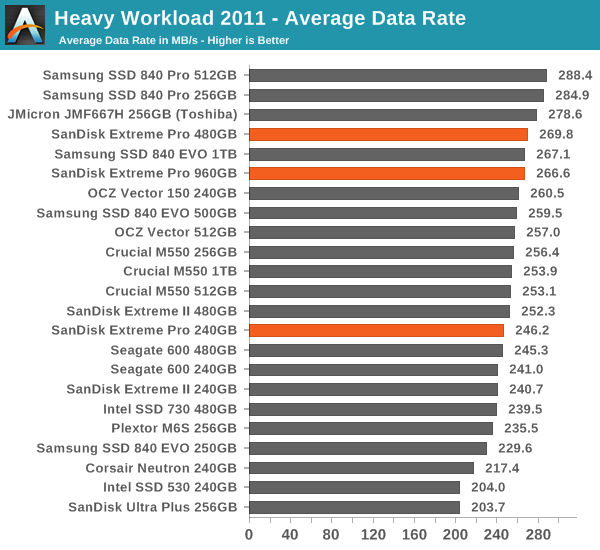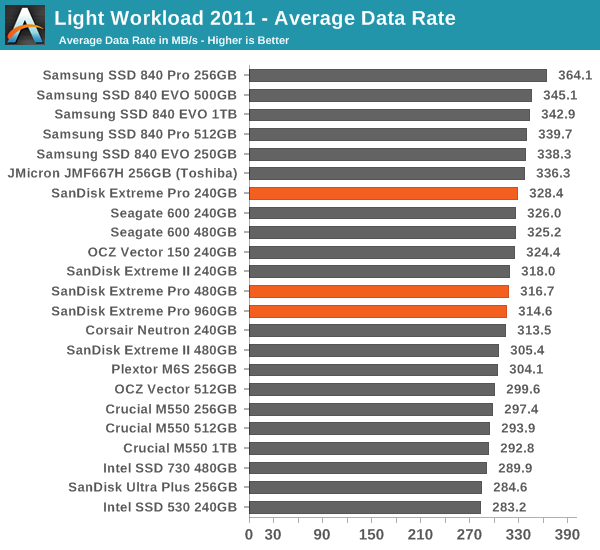SanDisk Extreme Pro SSD (240GB, 480GB & 960GB) Review: The Fastest Just Got Faster
by Kristian Vättö on June 16, 2014 4:00 PM EST- Posted in
- Storage
- SSDs
- SanDisk
- Extreme Pro
AnandTech Storage Bench 2011
Back in 2011 (which seems like so long ago now!), we introduced our AnandTech Storage Bench, a suite of benchmarks that took traces of real OS/application usage and played them back in a repeatable manner. The MOASB, officially called AnandTech Storage Bench 2011 - Heavy Workload, mainly focuses on peak IO performance and basic garbage collection routines. There is a lot of downloading and application installing that happens during the course of this test. Our thinking was that it's during application installs, file copies, downloading and multitasking with all of this that you can really notice performance differences between drives. The full description of the Heavy test can be found here, while the Light workload details are here.

The Extreme Pro does well in our older Storage Benches as well, although as you can see we have gotten to a point where the difference between SATA drives is less than 10% in most cases.











85 Comments
View All Comments
LtGoonRush - Monday, June 16, 2014 - link
The only improvements are idle power consumption and support for Low-Power DDR3, and this isn't really a mobile-targeted drive.Oyster - Monday, June 16, 2014 - link
10 years warranty. Love it. L.O.V.E. I.T. Thank you, SanDisk, for setting this trend. I'll surely wait, but I think this is exactly what I need for my next build.10 years... OMFG! Drool!
tential - Monday, June 16, 2014 - link
It's a great warranty but I think ssds potential failure points are less than an hdd. (my speculation).When I saw that though it definitely peaked my interest. Would have purchased this drive if it had been an option as that warranty would definitely make me feel better as I hold onto my hardware for a long time.
MrSpadge - Tuesday, June 17, 2014 - link
I'd still choose the MX100 over this any day. It's not like these drives are falling apart everywhere. And if you save the price difference between these drives you could use it to buy something significantly better in a few years, should the MX100 have failed by then (I wouldn't expect it to).nathanddrews - Tuesday, June 17, 2014 - link
This is pretty awesome:http://techreport.com/review/26523/the-ssd-enduran...
havefunbob - Tuesday, June 17, 2014 - link
that is really good testbinarycrusader - Monday, June 16, 2014 - link
How exactly is this a no compromise drive when it doesn't offer encryption and it doesn't offer capaciyor-based power loss protection? Data integrity and security seem like pretty big compromises. Or is the SLC buffer seen as a sufficient substitute for a capacitor-based solution?BillyONeal - Monday, June 16, 2014 - link
It is a no compromise drive for the market it targets -- the consumer market. Few / no consumer-targeted drives have capacitors; pretty much all such drives are targeting the server market, such as Intel's SSD DC3700. Very few consumer drives offer TCG Opal, but some do, e.g. Samsung's 840 EVO.binarycrusader - Monday, June 16, 2014 - link
The author specifically mentioned disappointment at the lack of encryption, and the author, unlike you specifically used the phrase "only no compromise high-end SSD in the market" while simultaneously declaring Intel's 730 SSD, OCZ's Vector 150, and Samsung 840 Pro as being in that same "high-end" market. So it seemed rightfully bizarre to simultaneously proclaim it as a "no compromises" drive given the other drives the author also compared it to that are supposedly in the same market.Also, while you're right that few consumer-targeted drives have capacitors, the Crucial M500 does. And honestly, capacitors don't cost that much, but it's no wonder Intel's happy to let all of the other manufacturers fight over "razor-thin" margins.
Kristian Vättö - Tuesday, June 17, 2014 - link
Because the Extreme Pro is the only high-end SSD without the compromises that the three other SSDs have. Intel SSD 730 and OCZ Vector 150 don't support any form of low-power states and are thus not suitable for laptops. The 840 Pro, on the other hand, lacks IO consistency. All three drives are in the same high-end performance market, thus I'm comparing the Extreme Pro with them.Crucial's drives have capacitors that provide power loss protection but they are the only drives along with Intel's SSD 730. However, you can get away without capacitors if the firmware is designed not to rely too much on the DRAM cache. I would certainly like to see OEMs use capacitors more in consumer-grade drives but on the other hand, I'm not sure if I consider it to be that big of a deal. We don't have a proper way to test power losses, so I don't want to give too much value to a feature that may or may not be needed.